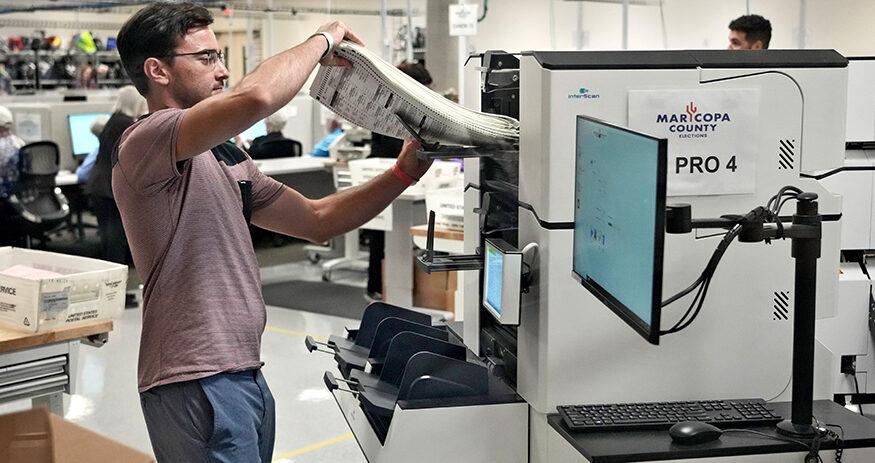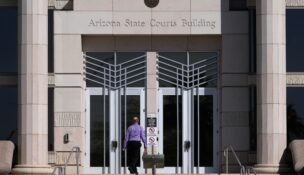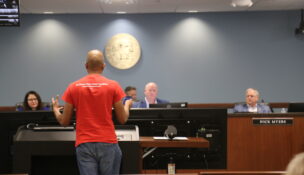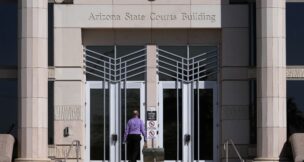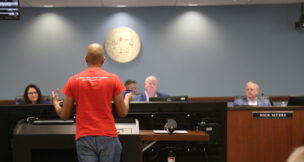Legislature to refer three bills to voters in 2026
Jakob Thorington Arizona Capitol Times//August 3, 2025//
Legislature to refer three bills to voters in 2026
Jakob Thorington Arizona Capitol Times//August 3, 2025//
Key Points:
-
Ballot referrals include food tax, drug cartel classification, monitoring vehicle mileage
-
Prop. 123 extensions and Florida-style election referrals likely to reappear in 2026
-
GOP lawmakers blame problems within party leadership for some failed proposals
The recent legislative session saw lawmakers approve three referrals to the 2026 ballot, but more may be coming.
More than two years after a similar piece of legislation was introduced and vetoed by Gov. Katie Hobbs, the Legislature will allow voters to decide whether to cap the municipal food tax rate at 2% with House Concurrent Resolution 2021.
The measure initially called to prohibit a municipality from taxing grocery food items outright, but lawmakers reached the 2% cap after negotiations with the League of Arizona Cities and Towns and newfound support from Democrats.
Sen. Mitzi Epstein, D-Tempe, called on her colleagues to vote against the resolution, citing a lack of Democratic support which could doom the measure to a rejection from Hobbs. However, there was not enough time to reintroduce the measure as a bill during the session, and lawmakers made the decision to put the proposal before voters in a last chance push to see it through.
The Legislature will also ask voters if drug cartels should be classified as terrorist organizations with House Concurrent Resolution 2055, which was one of the priorities for House Speaker Steve Montenegro.
The Goodyear Republican was the primary sponsor of the measure and of a similar bill in 2023 that Hobbs vetoed. In her veto message, Hobbs wrote that the measure wasn’t a “real solution” that carries any enforcement mechanisms.
If voters pass the measure, the Arizona Department of Homeland Security would be charged with doing “everything within its authority to address the threat posed by drug cartels.” The department is an administrative agency that distributes federal homeland security grants.
“We are at the point where we need to acknowledge the dangers we have and put every tool that we can in the hands of law enforcement,” Montenegro told the Arizona Capitol Times.
The other referral that will appear on next year’s ballot is Senate Concurrent Resolution 1004, a measure sponsored by Sen. Jake Hoffman, R-Queen Creek, which would prevent government agencies and corporations from monitoring vehicle miles or implementing a fee or tax on vehicle miles traveled.
What to expect in 2026
The Legislature was unable to pass a ballot referral to renew Proposition 123, which uses money from the State Land Trust Permanent Fund for public schools. Still, with the measure’s expiration in July, it will be a major priority for lawmakers of both parties.
House Minority Leader Oscar De Los Santos, D-Laveen, said a Prop. 123 renewal plan didn’t get finished this year because Democrats are not willing to agree on codifying Empowerment Scholarship Accounts into the Arizona Constitution, which Republicans proposed with Senate Concurrent Resolution 1015.
“They’re tying it to funding for public schools. It’s a stunning admission of how unpopular ESAs are because they can’t fight for it on their own terms,” De Los Santos said. “We just need a clean extension of Prop. 123.”
Several Republicans expressed disappointment during the session when another ballot proposal that would have banned law enforcement agencies from using photo radar to issue traffic tickets failed late during the session on the House floor, 29-27. Four Republicans were not present for the vote.
Hobbs vetoed the bill version of that measure, and several House Republicans criticized chamber leadership for not bringing the resolution up for a vote when Republicans had greater attendance strength.
Rep. Alexander Kolodin, R-Scottsdale, accused House GOP leadership of playing games with the proposal by waiting to vote on it, but Montenegro said that the two legislative chambers have traditionally had an agreement to wait until the budget is through the Legislature before voting on concurrent resolutions.
House and Senate Republicans also failed to get their Florida-style elections ballot measure through the Legislature with Concurrent Resolution 2013. Under that proposal, the deadline to drop off early ballots would be 7 p.m. on the Friday before Election Day. It would have also required early mail voters to confirm their address each election cycle in counties with a population of more than 500,000.
Speeding up the state’s election results was a major priority for many Republicans, but late floor amendments to the measure caused some, including Sen. Shawnna Bolick, R-Phoenix, to vote against the idea on the Senate floor.
One of the provisions of the Senate floor amendment included requiring all buildings owned by a political subdivision of the state, including school facilities, to be used as voting locations if requested by the officer in charge of elections. It also would have removed all provisions of the Friday early ballot deadline.
Sen. John Kavanagh, R-Fountain Hills, and Rep. David Livingston, R-Peoria, attempted to increase the pay of state legislators with Senate Concurrent Resolution 1003, but the proposal never received a floor vote in the House. This measure would have asked voters if the salary of legislators should be increased to adjust for inflation. Legislator pay has been set at $24,000 since 1998.
Other ballot referrals that never got votes in the second chamber include:
- House Concurrent Resolution 2002 – A measure sponsored by Rep. Rachel Keshel, R-Tucson, that would prohibit voting centers and limit election precincts to 1,000 registered voters.
- House Concurrent Resolution 2015 – Peoria Republican Rep. Lisa Fink’s proposal to give the Legislature authority to appropriate federal grants and revenue sharing monies instead of the Governor’s Office.
- House Concurrent Resolution 2023 – Exempts veterans with a service-related disability from property taxes, sponsored by Kolodin.
- House Concurrent Resolution 2025 – Another proposal from Kolodin that would raise the passage threshold of a proposed amendment to the Arizona Constitution to 60% of the vote.
- House Concurrent Resolution 2053 – A resolution from Rep. Quang Nguyen, R-Prescott Valley, that would remove legislative immunity for violating traffic laws.
- Senate Concurrent Resolution 1006 – Sponsored by Sen. David Gowan, R-Sierra Vista, requires the governor and the Legislature to pass a joint resolution before the Arizona State Land Department can engage in a land exchange.
- Senate Concurrent Resolution 1008 – Requires a two-thirds vote from a county board of supervisors to increase taxes, sponsored by Senate President Warren Petersen, R-Gilbert.

